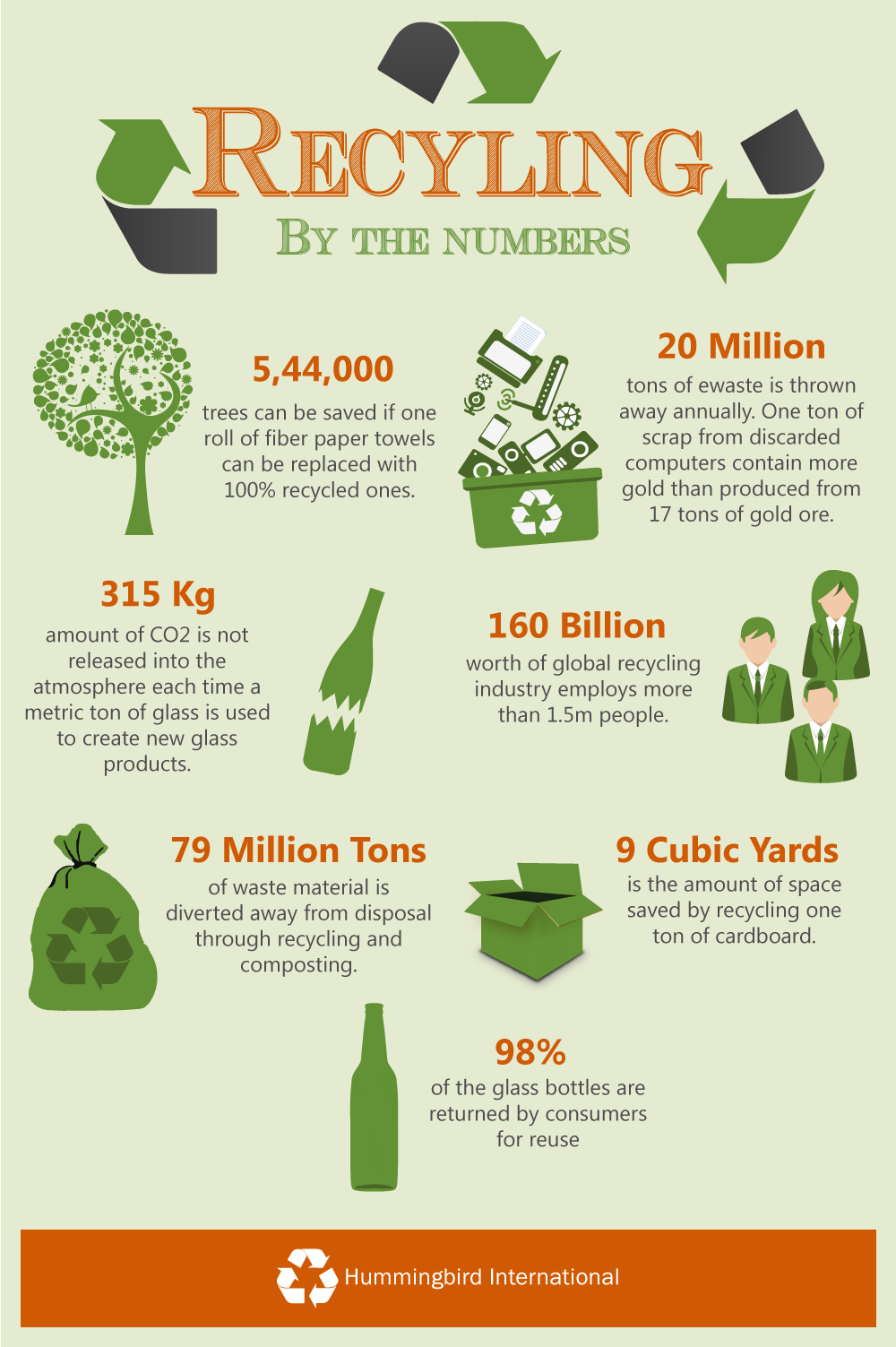On Global Recycling Day, I want to talk about the critical role recycling plays in our fight against climate change and resource depletion. Climate change is not just a distant concern; it impacts all of us.
How is the Global Recycling Scenario?
Recycling is not merely about sorting trash; it’s a systemic solution to some of the world’s pressing challenges.
The World Bank warns that global waste could surge by 70% by 2050 if we don’t change our practices. Each time we recycle, we reclaim precious materials—metals, plastics, paper—that help reduce our dependence on virgin resources.
Consider this:
- Waste accounts for 20% of human-related methane emissions (80 times more potent than CO₂).
- Each year, we collect 11 billion tonnes of solid waste worldwide, most of which ends up in our oceans or landfills.
- Alarmingly, according to the UN’s Global E-waste Monitor, we will generate 74 million tonnes of e-waste (including smartphones and computers) by 2030, with only 17.4% recycled.
Recycling is our most potent weapon against climate change.
- It cuts 700 million tonnes of CO2 emissions each year. To put this into perspective, recycling just one tonne of paper saves 17 trees and slashes water usage in manufacturing by 50%.
- Between 2020 and 2050, global Recycling has the potential to reduce emissions by an incredible 10.4-11.2 gigatonnes of CO2e.
The Economic Value of Recycling is unfathomable.
- The implications for the economy are equally significant. In 2029, the global waste management market will reach USD 1598.1 billion.
- Developing economies like Indonesia, India, and Vietnam still survive on waste management and Recycling to advance their economies.
While Recycling is a lifeline for the planet, we can’t overlook the hidden human cost of waste management.
I am exposed to the brutal reality faced by informal waste workers, often from marginalised communities.
- These individuals daily confront hazardous waste at landfills, exposing themselves to toxic materials.
- The e-waste crisis amplifies this issue, as discarded electronics can contain lead, mercury, and cadmium—substances that cause irreparable and irreversible harm to people and the planet. Inevitably, the damage is intergenerational.
- We must acknowledge their struggle as they extract valuable materials(as we mindlessly discard gadgets) and advocate for better working conditions and protections for these vulnerable groups.
Check out this blog I’ve published on E-Waste: The Hidden Crisis,

We must be mindful of what we consume and discard!
One of the root issues plaguing our recycling systems is the zero accountability we have on waste.
- Many consumers discard items without considering their production and disposal’s socio-economic and political implications.
- After we’ve used products, we often lose track of where they end up. This disconnect leads to a cycle of exploitation, where those who extract valuable raw materials also deal with our waste, perpetuating a cycle of ecological, social, and health crises.
- The journey is often opaque when we trace the raw materials to manufacturing and distributing products. Still, we must not stop demanding transparency and traceability throughout products’ lifecycles!
We need more investments in Recycling.
Despite these challenges, the recycling industry is becoming a hotbed of innovation and investment, as I’ve highlighted in my Substack piece, Trends Shaping 2025: The Shift Toward Sustainability. However, we need more.
- Companies now use AI and robotics to enhance sorting efficiency and develop advanced chemical recycling methods.
- For example, the global automatic plastic recycling market will reach US$ 40.7 billion by 2034!
- Major companies like Amazon are investing in recycling infrastructure to meet sustainability goals. Initiatives like their USD 2 billion Climate Pledge Fund support startups like Molg and Glacier innovating in this crucial space.
Why We Can’t Do Away With Recycling (Yet)
While I appreciate technological advances like AI and nuclear energy, Recycling is not dispensable.
- Our world relies on finite resources, including rare earth metals, and Recycling is essential to keeping these materials in circulation.
- Even with cutting-edge technologies like nuclear-fusion tech, waste generation will not cease, but Recycling can significantly mitigate its impacts.
- Recycling provides livelihoods for millions, especially in developing economies. Transitioning away from it without viable alternatives could disrupt entire communities.

How can we Reimagine the Waste Management Ecosystem to be more just, equitable, profitable, and safe?
- We can create new markets for recycled items (reducing our dependency on virgin materials) if we treat waste as a resource.
- Check out my company, Dense by RecycleNXT, which makes bags from recycled plastics and other materials.
- Consumers and companies need to take responsibility for the entire lifecycle of products, from sourcing to disposal. Technologies like blockchain can help trace products’ origins and impacts, creating transparency and accountability.
In my Substack piece, Hidden Costs of Going Green, I explored how Recycling intersects with other climate solutions. For instance, the rise of urban mining—extracting valuable materials from e-waste—is a game-changer for resource recovery. Similarly, the integration of AI in waste management is making Recycling smarter and more efficient, paving the way for a truly circular economy.
However, as mentioned above, the resource extraction and waste management industry has social costs. We must give informal workers safer, dignified working conditions and the agency to participate in a formal economy.
We must relook at Recycling—as a just and equitable tool to combat climate action and give us a sustainable future.
Every action, no matter how small, can create positive change. But to make it work, we must address our current systems’ human and environmental costs.
The question isn’t whether we should recycle but how to innovate and invest in making Recycling smarter, more efficient and more inclusive.
Sources:
- https://www.worldbank.org/en/news/press-release/2018/09/20/global-waste-to-grow-by-70-percent-by-2050-unless-urgent-action-is-taken-world-bank-report
- https://www.ifc.org/en/blogs/2024/thwe’veld-has-a-waste-problem
- https://www.bbc.com/future/article/20230317-how-recycling-can-help-the-climate-and-other-facts
- https://www.weforum.org/stories/2022/06/recycling-global-statistics-facts-plastic-paper/
- https://www.marketsandmarkets.com/Market-Reports/waste-management-market-72285482.html
- https://www.globenewswire.com/news-release/2024/12/05/2992389/32656/en/Automatic-Plastic-Recycling-Market-Forecasted-to-Grow-to-US-40-7-Billion-by-2034-Amid-Strong-Push-for-Sustainability-Transparency-Market-Research-Inc.html
- https://www.aboutamazon.com/news/sustainability/amazon-climate-pledge-fund-investments-molg-paebble-14trees
Source link : View Article
Author
-

Deepa Sai is an entrepreneur and consultant managing a couple of ventures in the Sustainability, Climate, Deep tech, Emerging Tech, Venture Building, Startup Advisory, and Impact Investment sectors. She has a background in Psychology, Social Work, Human Resources, Marketing, Branding, Thought Leadership, Communications, and Consulting.



